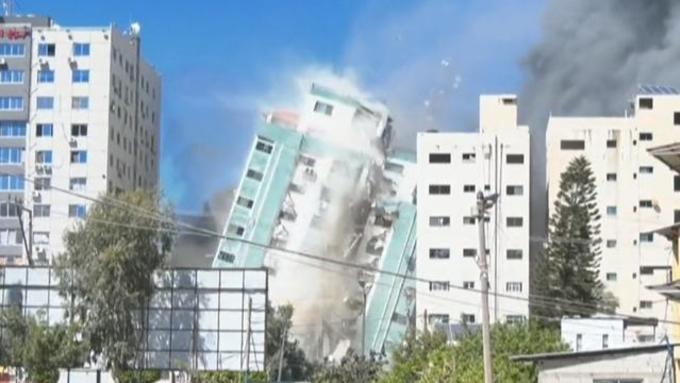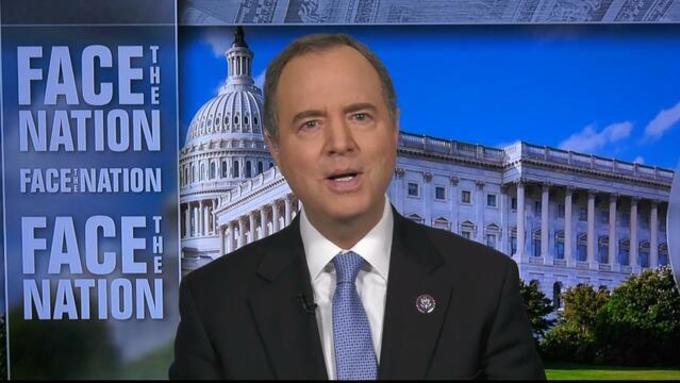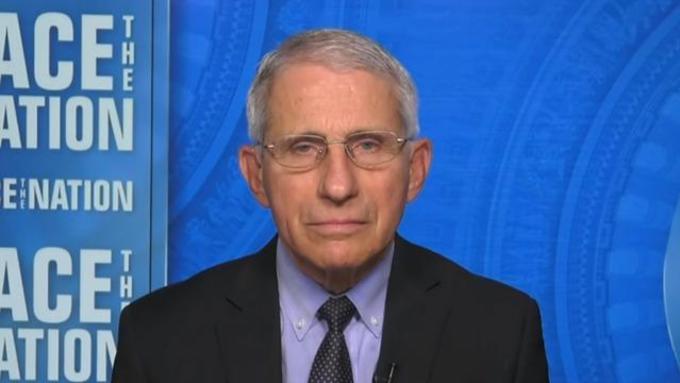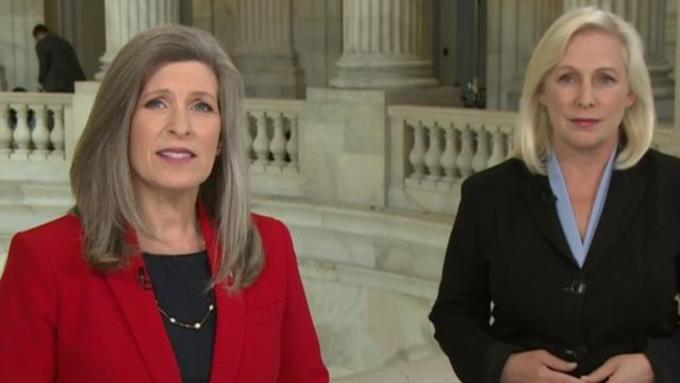| "In other words, you become a dead end to the virus. And when there are a lot of dead ends around, the virus is not going to go anywhere." - Dr. Anthony Fauci on preventing community spread through vaccination
Welcome to "Face the Nation"'s Five at Five newsletter. Scroll down for your five takeaways from today's broadcast of "Face the Nation" with Margaret Brennan on CBS. Plus: Newsletter subscribers get a first-read of our Q&A with former CDC director Dr. Richard Besser on the CDC's latest COVID-19 mask guidelines and the return to "normal." Did someone forward you this? Sign-up at cbsnews.com/email. 1. Netanyahu defends Gaza strikes, says Israel will do "whatever it takes to restore order"  Israeli Prime Minister Benjamin Netanyahu on Sunday defended his country's continuing airstrikes in Gaza, arguing Israel will do "whatever it takes to restore order" in the region and bring an end to rocket attacks by Hamas. What Netanyahu said: "I think any country has to defend itself. It has a natural right of self-defense. We'll do whatever it takes to restore order and quiet and the security of our people and deterrence. We're trying to degrade Hamas' terrorist abilities and to degrade their will to do this again. So it'll take some time. I hope it won't take long, but it's not immediate." Why it matters: Hostilities between Israel and the Palestinians are at their most deadly in years, with the most recent outbreak of violence starting in east Jerusalem earlier this month. The Palestinian Ministry of Health reports more than 180 Palestinians have been killed in the clashes, including 52 children, with another 1,200 wounded. Eight Israelis have been killed, including two children. Hamas and other militant groups have fired roughly 2,900 rockets into Israeli territory, and the Israeli military said its air defenses intercepted 1,150 of those rockets. 2. Dozens killed in Israeli airstrikes on Gaza City as bombardment intensifies  CBS News foreign correspondent Imtiaz Tyab reports from Tel Aviv on the dramatic escalation of violence in the Mideast. 3. Schiff says Biden administration should "push harder" to end Mideast violence  House Intelligence Committee Chairman Adam Schiff on Sunday urged the Biden administration to "push harder" to end the ongoing violent conflict between Israel and Hamas, which escalated over the weekend with Israeli airstrikes on Gaza City. What Schiff said: "The death toll increases and the violence has got to stop. And I think we need to do everything possible to bring about a cease fire. I think the administration needs to push harder on Israel and the Palestinian Authority to stop the violence, bring about a cease fire, end these hostilities, and get back to a process of trying to resolve this long-standing conflict." Why it matters: Diplomatic efforts are underway to broker a cease-fire between Israel and Hamas, and the Biden administration last week sent an envoy, Deputy Assistant Secretary State Hady Amr, to the region to urge de-escalation. On Saturday, the White House said President Biden spoke with both Israeli Prime Minister Benjamin Netanyahu and Palestinian Authority President Mahmoud Abbas to stress the need for Hamas to stop firing rockets into Israel and encourage an end to the violence. 4. Fauci says CDC's updated mask guidance is "based on the evolution of the science"  Dr. Anthony Fauci, chief medical adviser to President Biden, said Sunday that updated mask guidance for Americans who are fully vaccinated against COVID-19 was "based on the evolution of the science" as the Centers for Disease Control and Prevention (CDC) learned more about the real-world effectiveness of the shots. What Fauci said: "The underlying reason for the CDC doing this was just based on the evolution of the science. But if in fact this serves as an incentive for people to get vaccinated, all the better. I hope it does actually." Why it matters: The CDC said Thursday that anyone who is fully vaccinated can shed their masks and forgo social distancing for most indoor and outdoor activities, regardless of gathering size, marking a substantial return to normalcy in the long fight against the coronavirus pandemic. In the wake of the new guidance from the health agency, the White House lifted its own mask requirement for fully vaccinated staff. 5. Ernst and Gillibrand hail bipartisan backing for addressing sexual assault in the military  The push to overhaul how the military handles sexual assault cases is moving closer to becoming law thanks in large part to the collaborative effort of New York Democratic Senator Kirsten Gillibrand and Iowa Republican Senator Joni Ernst. What Ernst said: "We want Americans to see that bipartisanship is alive and well. It takes friendships. It takes a lot of discussions and certainly a partnership and finding compromise through that collaboration. This is what the rest of the Congress should be doing at a time like this too." Why it matters: Last month, Gillibrand introduced legislation in the Senate that would move prosecutorial decisions for serious crimes out of the chain of command and into the hands of independent military prosecutors. Ernst, Gillibrand and Iowa Republican Senator Chuck Grassley said Friday that they had secured enough co-sponsors on the bill to overcome a filibuster. Five at Five exclusive: We asked a CDC director about the new masking guidelines The Centers for Disease Control and Prevention announced Thursday that fully vaccinated Americans no longer need to wear masks or social distance in most indoor and outdoor settings, regardless of gathering size. This followed the CDC's approval Wednesday for children between the ages of 12-15 to receive the Pfizer vaccine. These announcements signal a return to normalcy in the U.S., but how "normal" will this summer and the rest of the year ahead be? Here's what Dr. Richard Besser, former acting CDC director and president of the Robert Wood Johnson Foundation told us. Newsletter readers get a first read on our Q&A with Dr. Besser. Check back on FaceTheNation.com and our social channels for the full interview tomorrow. What is your assessment of where the country is now in terms of immunity, vaccination rates, and vaccination eligibility? How "normal" is this summer going to look? We have reached a true turning point in the pandemic in the United States. We have three authorized vaccines that are highly safe and effective; we have enough vaccines for everyone who is eligible to receive one; and those who are fully vaccinated can now safely enjoy many of the freedoms and activities they have missed since the pandemic began. For millions of Americans, this summer will be very different from last summer, and that's a great thing. Having said that, this pandemic is far from over. The U.S. is still averaging tens of thousands of cases and hundreds of deaths per day, with a disproportionate share of cases, hospitalizations, and deaths affecting people of color. We must continue to make it easier for anyone who wants to get vaccinated to do so, and increase our outreach into the communities that have been hit the hardest. And we cannot forget that the virus is still raging in countries around the world, many of which have not received a single shipment of vaccines. We must not only remain vigilant in our country, but meet our responsibility to provide more help to other nations that are struggling mightily without the resources and vaccine supply the United States enjoys. With almost 17 million children now eligible for the vaccine, how long before the U.S. achieves herd immunity? When can we expect children under the age of 12 to be eligible to receive the vaccine? I've stopped talking about herd immunity. Herd immunity is reached when a sufficient percentage of the local population have been vaccinated or have had the disease so that transmission grinds to a halt. I don't believe it is attainable everywhere for COVID-19 and it misses the most critical point: every single person who gets vaccinated gets personal protection from infection and also helps reduce the spread of COVID-19 in their community. The ongoing national conversation around herd immunity may hurt more than it helps because it gives the sense that if we don't hit a singular "magic number," we've lost the battle against COVID-19, and that if we hit that number, we've won. Vaccination rates will vary markedly by community, which means that risk of community spread will vary as well. With respect to children under age 12, the FDA's vaccine advisory committee will meet in June to discuss vaccines for young children, who typically require different dosage levels than adults. Given the markedly reduced risk of severe infection and death in very young children, the committee will be able to indicate what they would like to see as they consider vaccine authorization. Pfizer has announced that it intends to submit clinical trial data to the FDA for children ages 2-11 by September, and data for infants ages six months to 2 years by the end of the year. How long do you think it will be until we can all get rid of our masks for good? That depends. CDC will continue to evaluate the science, the trajectory of the pandemic, the levels of vaccine coverage, and the risk in various venues. We may have learned during this pandemic that in some settings (such as nursing homes) and at some times of the year (the winter), masks may need to be a permanent new normal. We may also find that given how effective masks were at reducing seasonal influenza, some mask wearing is here to stay.
|
No comments:
Post a Comment